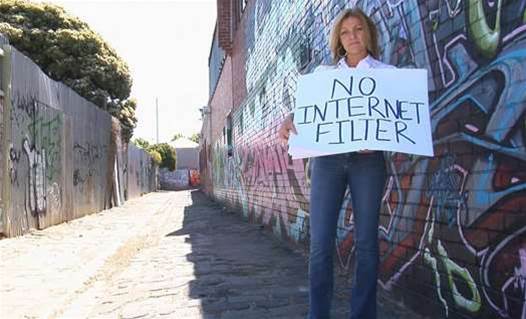Corporate web filters at organisations such as Shell and the National Australia Bank are blocking web access to the registered Australian Sex Party.

It was contesting the August 21 Federal Election with seven candidates in Victoria, including convenor Fiona Patten, who challenges Communications Minister Senator Stephen Conroy.
Organisations block access to the party's website at www.sexparty.org.au because of how their web filtering solutions use keywords to classify sites.
One such filter was in place at Conroy's Department of Broadband, Communications and the Digital Economy during a content filtering trial last year.
A department spokesman declined to disclose details of that product. He said it was unsuccessful in the trial. The department now uses ContentKeeper software.
"One of the products being trialled blocked this site using its default settings ... This site is no longer blocked," she said. "The Department does not filter legitimate political content."
Vendor classification
The party's website was classified as 'pornography - minimal risk' in McAfee's Trusted Source database, which underpins its enterprise-grade Web Gateway, SiteAdvisor and SmartFilter software.
McAfee's Asia-Pacific vice president and chief technology officer Michael Sentonas told iTnews that the site was viewed as "inappropriate" because it linked to "extremely graphic" affiliate sites and photos of events such as Sexpo.
Whether the site was blocked in a McAfee customer network depended on their policies, he said.
"McAfee's products make every attempt to provide full flexibility as to the type of content that is allowed past the filter," he said. "For instance, a primary school may utilise a very different policy than a University.
"Every attempt is made to maintain an objective view of the web contents and correlate that to the publically available content categorisation definitions in order to empower our customers to create the appropriate policies for their organisations."
The offending website came under the category of 'Advocacy Groups' in a URL database managed by Websense, which provided enterprise web security gateway and filtering software.
According to Websense's marketing manager David Brophy, Websense filtering products would enable access to advocacy groups' sites by default, although customers could block access to these sites if they chose.
Trent Davis, chief technology officer of Netbox Blue, said that blocking access to the site at Australian enterprise networks would likely be inadvertent; it was typically accessible to Netbox customers.
"Some simpler systems would block it as they put a heavy emphasis on key words and images on the site, not factoring in the grammar and 'intent' of the site," he said.
"My belief, in the case of the simpler systems, this would be inadvertent as many systems rely exclusively on automated classification."
Davis said his products used a "more advanced automated system" that referred websites the system could not confidently categorise to a human operator who reviewed the site within a day to update its classification.
"Regarding the blocking of sexparty.org.au, in a typical corporate environment with a Netbox, this would not be blocked as it is classified as a political site," he said.
Corporate blocks
Neither Shell nor NAB would disclose details of their web filtering software.
Shell Australia spokesman Paul Zennaro said employees could contact tech support for access to the site. Access was typically granted for legitimate requests, he said.
A NAB spokesman said the bank had "clear policies governing the use of electronic communication, including the Internet."
"Like other corporations, NAB also make use of standard internet content filtering services that block certain material deemed to be inappropriate," she said.
"At the moment, these standard filtering services are filtering out the sexparty.org.au content."
Party convenor Patten said she was aware of filtering issues. The party has taken a strong anti-filter stance in its 2010 campaign, opposing Labor's proposal to mandate ISP-level content filtering.
When the party launched in November 2008, Patten could not access the website from airport lounges and had difficulty sending media releases to major news networks, she said.
"We're a Federal political party. We've been approved by the Australian Electoral Commission," Patten said. "I am aware of some corporations blocking it [the website], which shows the inadequacies of current software."
Although she acknowledged that the term 'sex' in the party's website URL could be responsible for its filtering woes, Patten said the party was unlikely to change its name.
"I think the fact that people are still blocking our site just because of the word 'sex' in the name shows that we need this political movement," she said.


_(20).jpg&h=140&w=231&c=1&s=0)
_(33).jpg&h=140&w=231&c=1&s=0)

_(23).jpg&h=140&w=231&c=1&s=0)





 iTnews Benchmark Awards 2026
iTnews Benchmark Awards 2026
 iTnews Executive Retreat - Security Leaders Edition
iTnews Executive Retreat - Security Leaders Edition
 iTnews Cloud Covered Breakfast Summit
iTnews Cloud Covered Breakfast Summit
 The 2026 iAwards
The 2026 iAwards










_(1).jpg&h=140&w=231&c=1&s=0)



